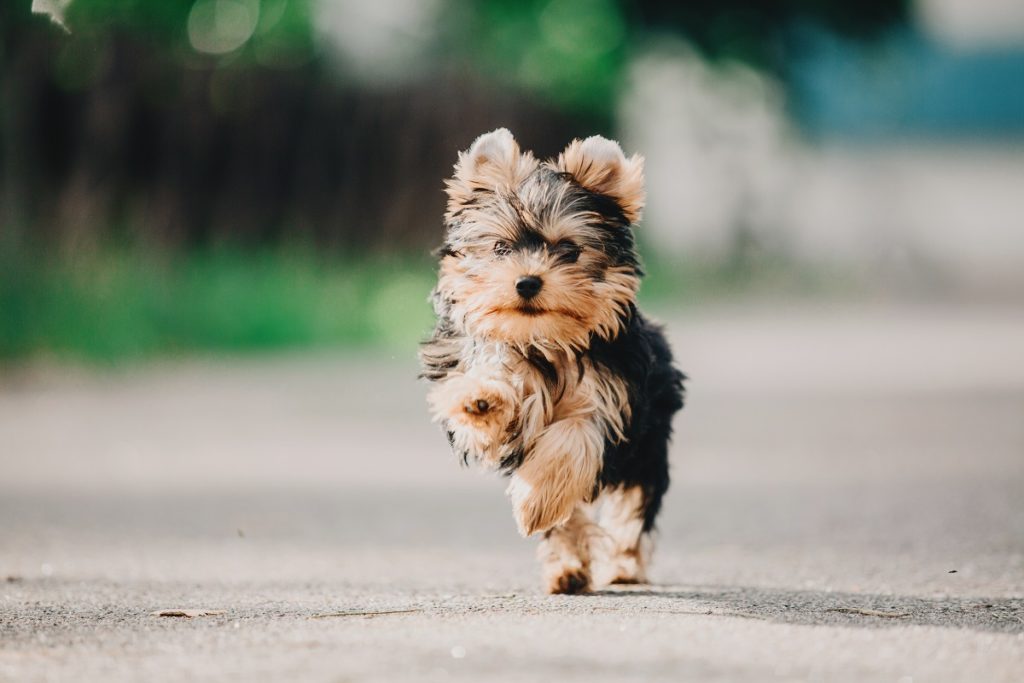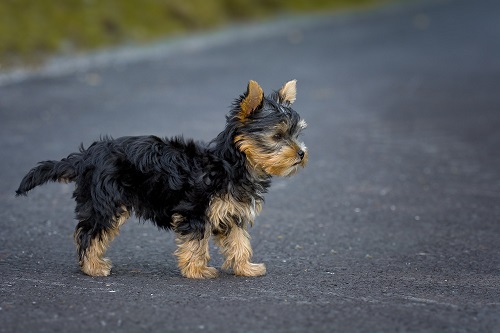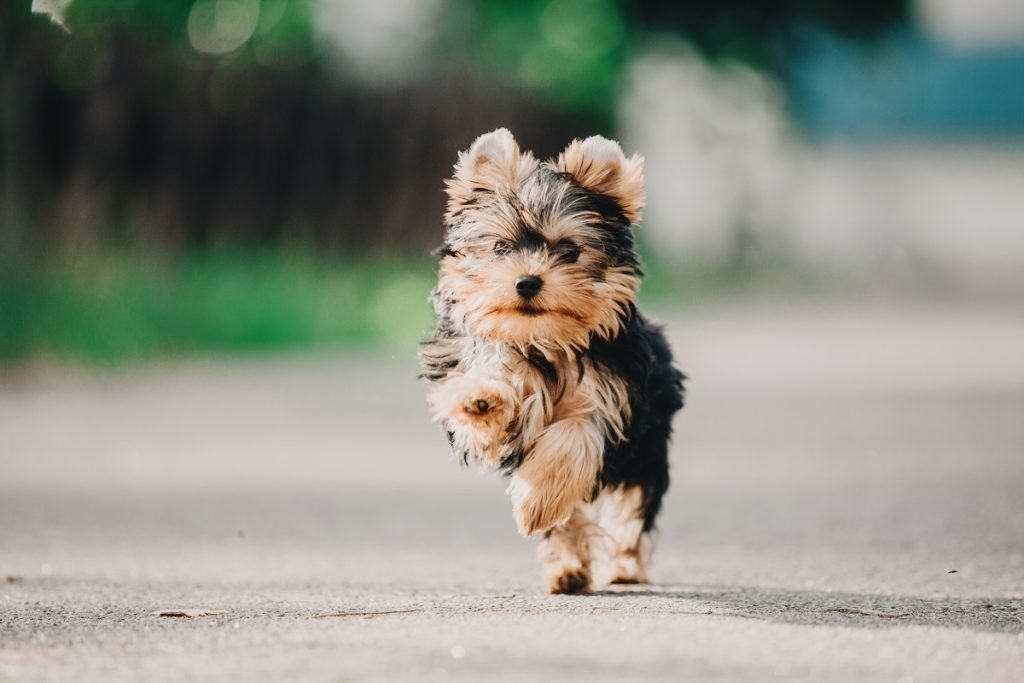When it comes to the size of a Yorkie Poodle, you may be surprised to learn that they are actually quite small. Despite having a name that sounds like it belongs to a larger breed, Yorkie Poodles, also known as Yorkie Poos, are pint-sized pups that won’t take up much space in your home. With their petite frames and adorable features, these designer dogs are a popular choice for people looking for a small, low-maintenance companion.
The size of a Yorkie Poodle can vary depending on the breeding. On average, they stand between 7 and 15 inches tall at the shoulder and typically weigh between 5 and 12 pounds. This makes them the perfect size for households of all types, including apartments or homes with limited space. Despite their small size, Yorkie Poodles are known for their big personalities and playful nature, making them an ideal choice for families, singles, or seniors looking for a loyal and affectionate four-legged friend.
The size of a Yorkie Poodle can vary, but on average, they typically stand about 8-12 inches tall at the shoulder and weigh between 4-15 pounds. They are considered a small breed dog, making them a great choice for apartment living or people with limited space. Remember that individual dogs may differ in size, so it’s always best to consult with a reputable breeder or veterinarian for more specific information.

Understanding the Size of a Yorkie Poodle
The Yorkie Poodle, also known as the Yorkipoo or Yoodle, is a charming and adorable hybrid breed that combines the Yorkshire Terrier and the Poodle. Many people are drawn to this mixed breed because of their small size, intelligence, and hypoallergenic coat. If you are considering getting a Yorkie Poodle, you may be wondering how big they will get. In this article, we will explore the typical size range for a Yorkie Poodle and the factors that can influence their growth.
Genetics and Mixed Breeds
The size of a Yorkie Poodle can vary depending on several factors, including the genetics of the individual dog and the specific combination of Yorkshire Terrier and Poodle parent breeds. In general, Yorkie Poodles are considered small to medium-sized dogs, but their exact size can be difficult to predict.
Yorkshire Terriers are typically small dogs, weighing between 4 to 7 pounds (1.8 to 3.2 kilograms) and standing around 6 to 9 inches (15 to 23 centimeters) tall at the shoulder. Poodles, on the other hand, come in three different sizes: toy, miniature, and standard. Toy Poodles weigh around 4 to 6 pounds (1.8 to 2.7 kilograms) and stand about 10 inches (25 centimeters) tall. Miniature Poodles weigh between 10 to 15 pounds (4.5 to 6.8 kilograms) and stand around 11 to 15 inches (28 to 38 centimeters) tall. Standard Poodles are the largest, weighing between 45 to 70 pounds (20 to 32 kilograms) and standing around 22 to 27 inches (56 to 69 centimeters) tall at the shoulder.
Size Variations in Yorkie Poodles
Given the variety in sizes of the Yorkshire Terrier and the Poodle, Yorkie Poodles can inherit characteristics from either parent breed. As a result, their size can fall anywhere within the range of the parent breeds, or somewhere in between.
On average, most Yorkie Poodles are small dogs that weigh between 4 to 15 pounds (1.8 to 6.8 kilograms) and stand around 7 to 15 inches (18 to 38 centimeters) tall at the shoulder. However, it is not uncommon to find Yorkie Poodles that are smaller or larger than this range. Some may be as small as 3 pounds (1.4 kilograms) or as large as 20 pounds (9 kilograms). The exact size of a Yorkie Poodle can also be influenced by other factors such as the size of their parents and the specific genetic traits they inherit.
Factors That Influence Size
Several factors can influence the size of a Yorkie Poodle:
- Genetics: As mentioned earlier, the genetics of the individual dog and the parent breeds play a significant role in determining their size. The size of the parents and the specific combination of genes they pass on to their offspring can impact how big a Yorkie Poodle will grow.
- Diet and Nutrition: Proper nutrition is essential for the healthy growth and development of any dog. Providing a balanced and appropriate diet can support optimal size and weight for a Yorkie Poodle.
- Exercise and Activity Levels: Regular exercise and physical activity are important for maintaining a healthy weight and preventing obesity. Being overweight can lead to health issues and potentially affect the size of a Yorkie Poodle.
- Health and Genetics Testing: Some health conditions and genetic factors can impact a dog’s growth and overall size. It’s essential to work with a reputable breeder who conducts health and genetic testing to ensure the well-being of the puppies.
Caring for a Yorkie Poodle
Regardless of the size your Yorkie Poodle grows to be, they require proper care and attention. Here are some tips for taking care of your Yorkie Poodle:
- Grooming: Yorkie Poodles have a hypoallergenic coat that requires regular grooming to prevent matting and keep them looking their best. Regular brushing, bathing, and professional grooming can help maintain their coat.
- Exercise: Although small in size, Yorkie Poodles are energetic and need regular exercise to stay healthy and prevent behavioral issues. Daily walks, playtime, and mental stimulation are important for their well-being.
- Training: Like any dog, Yorkie Poodles benefit from proper training and socialization. Positive reinforcement techniques can help teach them commands, obedience, and good behavior.
- Nutrition: Provide your Yorkie Poodle with a balanced diet that is appropriate for their size, age, and activity level. Consult with your veterinarian for recommendations on the right food and portion sizes.
- Healthcare: Regular veterinary check-ups, vaccinations, and preventive care are essential for the overall health and well-being of your Yorkie Poodle. Discuss any concerns or questions you have with your veterinarian.
Comparing the Size of Yorkie Poodles with Other Small Dog Breeds
In comparison to other small dog breeds, Yorkie Poodles generally fall within the average size range. Here’s a comparison of the average size of Yorkie Poodles with other popular small dog breeds:
| Yorkie Poodle | 4-15 pounds (1.8-6.8 kilograms) | 7-15 inches (18-38 centimeters) |
| Maltese | 4-7 pounds (1.8-3.2 kilograms) | 7-9 inches (18-23 centimeters) |
| Pomeranian | 3-7 pounds (1.4-3.2 kilograms) | 6-7 inches (15-18 centimeters) |
| Chihuahua | 2-6 pounds (0.9-2.7 kilograms) | 5-8 inches (13-20 centimeters) |
Key Takeaways: How Big Does a Yorkie Poodle Get?
- A Yorkie Poodle, also known as a Yorkipoo, is a small breed of dog.
- On average, they can grow to be around 7 to 15 inches tall at the shoulder.
- They usually weigh between 4 to 15 pounds.
- Their size can vary depending on the size of their parents.
- It’s important to remember that individual dogs may vary in size even within the same breed.
Frequently Asked Questions
Here are some commonly asked questions about the size of a Yorkie Poodle:
1. How big do Yorkie Poodles usually get?
Yorkie Poodles, also known as Yorkiepoos or Yoodles, can vary in size. On average, they typically reach a height of 7 to 12 inches (18 to 30 cm) at the shoulder and weigh between 4 to 15 pounds (2 to 7 kg). However, their size can be influenced by various factors including genetics, diet, and exercise.
It’s important to note that individual Yorkie Poodles may fall outside of this average range. Some may be smaller, known as teacup Yorkie Poodles, weighing under 4 pounds (2 kg), while others may be larger, classified as standard Yorkie Poodles, weighing above 15 pounds (7 kg).
2. Do Yorkie Poodles come in different sizes?
Yes, Yorkie Poodles come in different sizes. They can be classified as teacup, toy, miniature, or standard Yorkie Poodles. Teacup Yorkie Poodles are the smallest, weighing under 4 pounds (2 kg). Toy Yorkie Poodles weigh between 4 to 6 pounds (2 to 3 kg), miniature Yorkie Poodles weigh between 7 to 12 pounds (3 to 5 kg), and standard Yorkie Poodles weigh above 12 pounds (5 kg).
It’s important to consider the expected size when choosing a Yorkie Poodle as a pet, as it can impact their living space and exercise needs. It’s also worth noting that size classifications may vary slightly between different sources and breeders.
3. Can the size of a Yorkie Poodle be influenced by genetics?
Yes, genetics play a significant role in determining the size of a Yorkie Poodle. The size of the parent dogs, whether they are purebred Yorkshire Terriers (Yorkies) or Poodles, can influence their offspring’s size. If both parent dogs are small, there is a higher chance of the Yorkie Poodle puppies being smaller in size as well.
However, it’s important to note that genetics are not the only factor that determines the size of a Yorkie Poodle. Other factors such as diet, exercise, and overall health also play a role.
4. Do Yorkie Poodles continue to grow after puppyhood?
Yorkie Poodles typically reach their full height by the time they are around 12 months old. However, their weight may continue to fluctuate slightly until they are around 18 months to 2 years old. During this time, they may go through growth spurts and fill out their frame.
It’s essential to provide proper nutrition and regular exercise during their puppy and adolescent stages to ensure healthy growth and development.
5. Are there any health concerns associated with the size of a Yorkie Poodle?
Yorkie Poodles, like many small dog breeds, may be prone to certain health issues related to their size. These can include dental problems, patellar luxation (knee dislocation), hypoglycemia, and tracheal collapse.
Regular veterinary check-ups, a balanced diet, proper dental care, and regular exercise can help minimize the risk of these health concerns and ensure the overall well-being of a Yorkie Poodle.

Yorkie vs Yorkie Poo (What’s the difference)
In conclusion, the size of a Yorkie Poodle can vary depending on their parents’ sizes. On average, they are considered a small breed, typically reaching a height of 8 to 10 inches and a weight of 5 to 9 pounds.
It’s important to note that individual dogs within the breed may fall outside of these ranges. Overall, the size of a Yorkie Poodle makes them a great choice for those looking for a small and portable companion.
